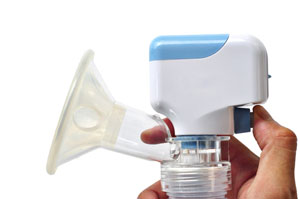This story comes from our partner ![]() .
.
Health insurance plans now have to cover the full cost of breast pumps for nursing mothers. This is the result of a provision in the Affordable Care Act (aka Obamacare), and the new rule took effect for many people at the start of this year.
 It’s led to a boom in the sale of the pumps, which can cost hundreds of dollars.
It’s led to a boom in the sale of the pumps, which can cost hundreds of dollars.
Yummy Mummy, a little boutique on New York’s Upper East Side, has suddenly become a health care provider/online superstore. The company has been hiring like crazy, and just opened an online call center and a warehouse in Illinois. Yummy Mummy even hired somebody to talk to customers’ health insurance companies.
And new moms now seem more likely to splurge on fancy new breast pumps. Caroline Shany, a Yummy Mummy customer, spent her own money to buy a breast pump for her first baby. She may buy another one now because insurance will pick up the tab.
“Why not?” she says.
Weird things happen when you take price out of the equation for consumers. For one thing, they stop looking for the best price. But even though breast pumps are free for new moms, somebody has to pay for them.
“Health insurance premiums are driven by how much we spend on health care,” says Harvard health economist Katherine Baicker. “The more things that are covered by health insurance policies, the more premiums have to rise to cover that spending.”
Advocates of requiring insurance companies to pay for breast pumps say that the measure will pay for itself in the long run.
UCLA’s School of Public Health Dr. Linda Rosenstock, who chaired the team that recommended this provision, says the science is unequivocal. Preventive-care spending upfront leads to fewer health problems down the road. Babies who are breast fed tend to be healthier, and paying for breast pumps should mean more babies are breastfed.
Economist Baicker isn’t sure that eliminating the cost of the breast pumps really induces much extra breastfeeding. She thinks that most of the money spent will go towards people who would have been breastfeeding anyway. “So the question is whether the value that those people get from the breast pumps is worth the cost in terms of increased health spending and increased premiums,” she says.
The outcome may depend partly on how the new rules are implemented. Insurers are still trying to figure out whether to pay for extra-fancy breast pumps, or just basic models.






